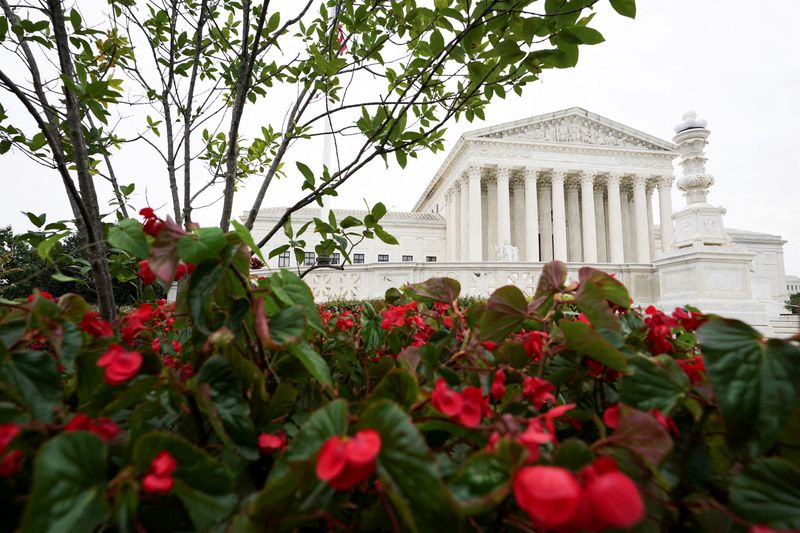By John Kruzel and Andrew Chung
WASHINGTON (Reuters) -The U.S. Supreme Court on Thursday put another dent in the regulatory reach of the Environmental Protection Agency, embracing a stringent new test for declaring wetlands protected under a landmark federal anti-pollution law in a ruling favoring an Idaho couple who challenged the agency.
The 9-0 decision authored by conservative Justice Samuel Alito overturned a lower court's ruling against Chantell and Mike Sackett that had upheld the EPA's determination that their property near a lake contained wetlands protected by the Clean Water Act of 1972. The Sacketts have battled with the EPA for years over their plans to build a home on the property.
Although the court unanimously sided with the couple, four justices - including the court's three liberal members and conservative Brett Kavanaugh - disagreed with the new test announced by the court that was backed by the five other conservative justices. The four justices said the test could undermine water quality and flood control in the United States.
President Joe Biden said in a statement that the ruling upends the legal framework used for decades to combat water pollution and that his administration will "use every legal authority we have to protect our nation's waters."
"It puts our nation's wetlands - and the rivers, streams, lakes and ponds connected to them - at risk of pollution and destruction, jeopardizing the sources of clean water that millions of American families, farmers and businesses rely on," Biden said of the ruling.
The ruling marked the latest instance of the court backing a challenge to the scope of the EPA's ability to regulate in the environmental arena under existing law. In a 6-3 ruling last June powered by its conservative justices, it imposed limits on the EPA's authority to issue sweeping regulations involving greenhouse gas emissions from existing coal- and gas-fired power plants under a different environmental law, the Clean Air Act.
The Sacketts in 2004 bought an undeveloped plot of land about 300 feet (90 meters) from Priest Lake, one of the largest lakes in Idaho, near the U.S.-Canada border. In 2007, the couple began preparing construction of a home on it.
But after placing sand and gravel fill on the lot, the EPA issued an administrative compliance order stating the property contained wetlands protected by the Clean Water Act and that they needed a permit to build, which they had failed to obtain.
Alito, writing for the five-member majority, embraced what is called the "continuous surface connection" test for determining if adjacent wetlands are covered by the Clean Water Act.
"In sum, we hold that the (Clean Water Act) extends to only those wetlands that are 'as a practical matter indistinguishable from waters of the United States,'" Alito wrote, adding: "The wetlands on the Sacketts' property are distinguishable from any possibly covered waters."
The Clean Water Act bars discharging pollutants, including rocks and sand, into the "waters of the United States," which regulators for decades have said covers not just navigable waters but adjacent wetlands like swamps, marshes and berms.
Courts and regulators have been grappling for decades over how much of a connection with a waterway a property must have in order to require a permit, with the Supreme Court issuing a ruling in 2006 that led to further uncertainty.
Justice Elena Kagan, joined by fellow liberals Sonia Sotomayor and Ketanji Brown Jackson, accused the conservative majority of imposing its own policy preferences to curb the EPA's reach.
Noting that the Clean Water Act was adopted in the 1970s to address a widespread crisis over water quality nationwide, Kagan said the majority's decision undermines the clear intent of Congress to address pollution, with the majority having improperly appointed itself "as the national decision-maker on environmental policy."
Damien Schiff, a senior attorney at Pacific Legal Foundation who argued the case for the Sacketts, hailed the decision as a victory for property rights, saying it "returns the scope of the Clean Water Act to its original and proper limits."
Biden's administration in December finalized a rule expanding the definition of waterways that are protected under the Clean Water Act, in a reversal from former President Donald Trump's era.
Lower court challenges led to the enforcement of the new rule being halted in at least 27 states. Biden in April vetoed legislation that sought to overturn the rule but the Supreme Court's decision could cast doubt on the lawfulness of some parts of the new regulation.
The environmental advocacy group Earthjustice, which filed an amicus brief in the Sackett case, said the court's decision "undoes a half-century of progress generated by the Clean Water Act," eliminating protections from almost 90 million acres (36.4 million hectares) of wetlands.
